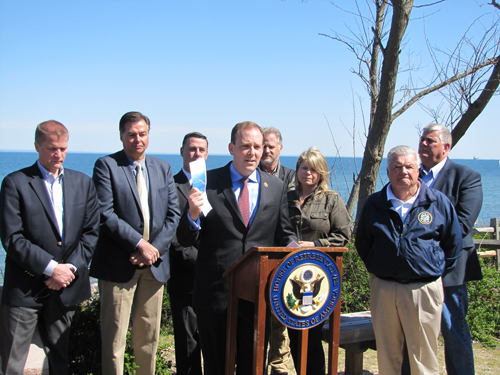Zeldin unveils new plan fight Plum Island sale

A bill aiming to stop the federal government’s proposed sale of Plum Island to the highest bidder is expected to be approved by the House of Representatives’ Homeland Security Committee on Thursday, opening the door for an eventual vote by the entire House, according to East End Congressman Lee Zeldin (R-Shirley).
“Plum Island is treasured by our local community,” said Mr. Zeldin, who outlined the new plan in a press conference Sunday in Riverhead. “It feels like you’re literally thousands of miles away from home when you visit. The scenery, the coastline, the wildlife right here off the coast of Long Island, is a treasure that must be protected.”
About 90 percent of the island, which has been home to a federal research lab since 1954, is undeveloped, he said, and offers “a diverse wildlife and ecosystem that is a critical habitat for migratory birds, marine mammals and rare plants.”
“We have a responsibility to protect the biodiversity found on Plum Island, including acres of shoreline and wetlands that are home to threatened species of birds, sea turtles and seals,” said Ashley Hunt-Martorano, the director of marketing and events for a non-profit group called Citizens Climate Lobby, who spoke at Sunday’s press conference.
Mr. Zeldin had proposed a bill last year to block the sale of the 840-acre property just east of Orient Point, but that bill was never put up for a vote.
The bill will now be revised to call for the federal Government Accountability Office, in consultation with the Department of Homeland Security, to come up with a comprehensive plan for the future of the island.
The federal government announced in 2005 that it would shut down the Plum Island Animal Disease Center and build a new research lab in Kansas, which was expected to open in 2022.
Plum Island, owned by the federal government since 1899, would then be sold.
Mr. Zeldin says the 2008 federal law that mandates the property be sold is “flawed” and was passed without consulting with federal agencies or with local officials and communities.
The revised bill, he said, has strong bipartisan support from Long Island and Connecticut delegates in the House and the U.S. Senate.
In an attempt to prevent private development of Plum Island, Southold Town officials rezoned Plum Island in 2013 at the suggestion of then-Councilman Al Krupski, who is now a county legislator, Southold Town Supervisor Scott Russell said.
The supervisor said he didn’t think officials were serious about selling Plum Island at the time, but Mr. Krupski did and said the town needed to do something about it.
“And I thought, who would be crazy enough to want to buy Plum Island?” Mr. Russell recalled. “Well, it was about that time that I got a call Donald Trump’s representatives. He wanted to put a golf course and resort there. And then we knew we had to take some action.”
Mr. Zeldin is seeking to stop such proposals from being considered.
“During this (study) process, there can be no steps whatsoever taken in pursuit of sale of the island,” Mr. Zeldin said at Sunday’s press conference on Reeves Beach in Riverhead, surrounded by state, county and local officials from Southold and Riverhead towns. “This plan will include possible alternative uses for the island including a transfer of ownership to another federal agency or to the state or local government, a nonprofit organization or a combination thereof, for the purpose of education, research and conservation.”
Mr. Zeldin said he has been in discussions with the offices of U.S. Senators Charles Schumer and Kirsten Gillibrand, as well as with Connecticut Senator Richard Blumenthal to come up with a version of the bill in the U.S. Senate.
Both Mr. Schumer and Mr. Blumenthal have recently made public statements in opposition to the sale of Plum Island.
The Department of Homeland Security, which owns Plum Island, has already started to study alternative uses for the land, Mr. Zeldin said.
Under the proposal up for a vote on Thursday, “If that study comes back and we like it, we will support it. If we don’t like it and we need a more thorough and extensive study, the (revised) law will be triggering a GAO study that will be much more extensive than what the Department of Homeland Security is doing right now,” he said.
The Animal Disease Center on Plum Island has conducted scientific research on a variety of infectious animal-borne diseases, including foot-and-mouth disease.
Plum Island also contains “cultural, historical, ecological, and natural resources of regional and national significance,” the bill states.






